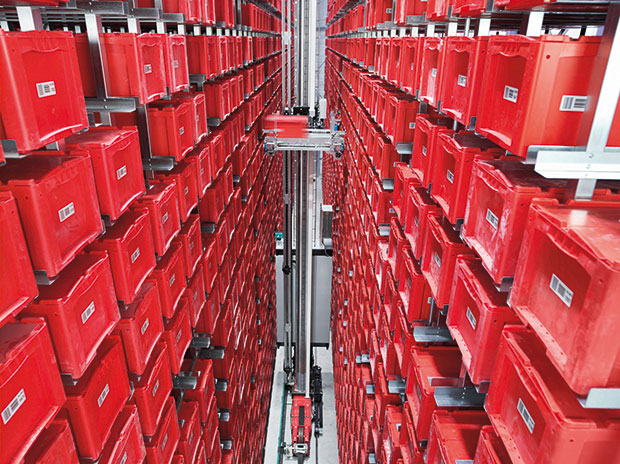To form resilient value chains to uphold delivery commitments to customers, high-performance intralogistics is needed. Almi, the spice specialist based in Oftering, in Upper Austria, commissioned TGW Logistics Group to update its warehouse. The TGW experts implemented the project in record time – during ongoing operation and despite the effects of the COVID-19 pandemic.
 Since its founding in 1931, Almi – a manufacturer of specific blends – has experienced constant growth. The Upper Austrian company earns approximately 132 million euros in sales per year, with almost 90 percent of its products being exported.
Since its founding in 1931, Almi – a manufacturer of specific blends – has experienced constant growth. The Upper Austrian company earns approximately 132 million euros in sales per year, with almost 90 percent of its products being exported.
The Almi warehouse in Oftering was built in 2006 by TGW. The heart of the system is the automatic mini-load warehouse with three aisles, tote buffer, and carton, tote and pallet conveyor systems on three levels. To boost the performance of the intralogistics, the system was equipped with energy-efficient conveyor technology. In 2017, TGW was asked to update the warehouse management system.
Together towards a green future
To continue to uphold delivery commitments and to lay the foundation of future growth, Almi ruled out the prospect of expanding its facilities. “Sustainability is of great importance to Almi. We do not want to pave over more green areas, so we decided from the beginning to optimise the existing facility so that we will be well equipped for the future,” says Stefan Lackinger, Almi’s Production Manager.
TGW was selected as the partner of choice for a retrofit of the automated tote warehouse with approximately 10,000 storage locations. The initial impulse came from TGW retrofit experts, who noted that some components were outdated and that there was a risk that they would break down. TGW experts presented a concept made up of multiple components: changing out a storage and retrieval machine, replacing the mechatronics of the commissioner lifting beam system, updating three carriages and one belt-driven lift, and implementing new control technology.
To replace the storage and retrieval machine, TGW provided a Mustang E+ of the latest generation. Its advantages: it weighs less than older units, it has a state-of-the-art control system and it does not require anti-oscillation technology. This makes it possible to save energy.
Retrofit during live operation
Unlike other industries, Almi cannot afford lengthy breaks. There’s a constant demand, thus posing major time management challenges for modernisation projects. TGW and Almi set a very tight schedule: the entire project would be executed around the Christmas and New Year’s holidays to reduce the standstill to a minimum.
The tight schedule was not the only challenge. “All steps up to the go-live on 7 January 2022 had to be planned in detail,” says Josef Fritz, Sales Project Manager at TGW. “Nevertheless, it was not possible to fully complete the project by January 6 as the plan had originally called for. However, this was not the fault of TGW. As a result of the COVID-19 pandemic and worldwide supply chain bottlenecks, the hardware was not replaced until April – at the weekends.”
Energy savings up to 20 percent
Despite the difficulties encountered, the project was successfully completed in late April 2022 and Almi is highly satisfied with the result. The retrofit boosted system availability and lowered the cost of spare parts for maintenance. “Furthermore, energy savings of up to 20 percent are now possible. In the past, unneeded braking energy of the storage and retrieval machines was simply lost. Now, we feed it directly back into the grid. Thanks to the modernisation done by TGW, we look to a greener future with confidence”, Lackinger says.




Comments are closed.